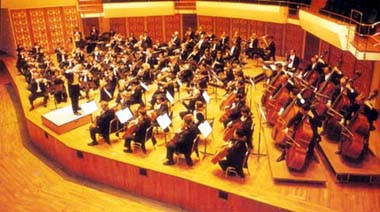|
Orchestral music Uphill fight for popular support By Wayne Leung |
 |
|
According to Mr. Paul Tam, the assistant general manager of the Hong Kong Philharmonic Society, which administers the orchestra, the number of members increased to 1,100 in recent years. The orchestra also launched the so-called “Young Audiences Scheme” in 1986. About 3,500 students from more than 141 schools have joined the scheme. “Besides arousing students’ interest in classical music, it also develops future audiences for the orchestra,” Mr. Tam said. The Pan Asia Symphony Orchestra also has fought hard for more support from the public in the past 20 years. “To make classical music more accessible to the public, we play simpler pieces,” said Dr. Yip Wai-hong, the music director of the orchestra. “We also hold educational concerts. We have given talks with concerts to teach the public the way to appreciate the beauty of classical music,” Dr. Yip said. Every year the Philharmonic Orchestra also invites pop singers to perform at the Hong Kong Coliseum. Jacky Cheung and Priscilla Chan have been invited in the past two years. “Undeniably, some audience members buy the tickets simply because they like the singers,” Mr. Tam said. “But I am sure that the new arrangements for the pop music done by the orchestra amuse the audience. The outstanding performance of the orchestra impresses them,” Mr. Tam explained. Ms Fanny Cheng is a 35-year-old housewife. She said pop orchestral concerts help to make orchestral music more popular. “People are more familiar with pop songs. These pop concerts help to bridge the gap between audiences and the orchestra,” said Ms Cheng. But Ms Christine Boucique, a 68-year-old retired teacher from Belgium, has a different opinion. “Preserving classical music in its pure form is better, or people may get to the point of losing their understanding of what true classical music is,” said Ms Boucique. However, budgets and subsidies affect the orchestras’ activities. While the Hong Kong Philharmonic Orchestra’s budget for the 1996/97 financial year is HK$84 million, about 80 percent of it coming from the Provisional Urban Council, the Pan Asia Symphony Orchestra could raise only about HK$4.1 million for 23 performances. “Because of the tight budget, our instrumentalists have their own daytime jobs,” Dr. Yip said. Ms Ada Wong, a member of the Provisional Urban Council, said a new policy that enables the orchestras to set long-term plan is being enforced. Said Ms Wong: “Local orchestras are asked to plan a 3-year proposal. After negotiation, the amount of the subsidy for the coming 3 years would be finalized. Both Dr. Yip and Mr. Tam said education is important for long-term development. “The government should have a fixed venue for educational concerts,” Dr. Yip said. “More money should be spent on this.” Added Mr. Tam: “The interest in classical music should be developed from childhood.” |
 Online bookstore
Online bookstore
December 1997
[Editorial] [Letters] [Answer] [News] [Social] [Photo] [Culture] [Education] [Channels] [Science] [Celebrity]
Comments Editor-in-Chief Electronic Editor